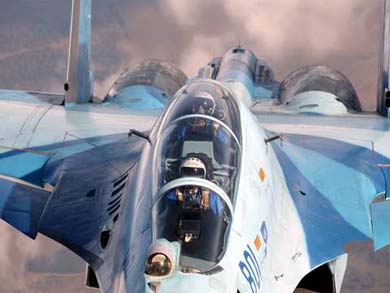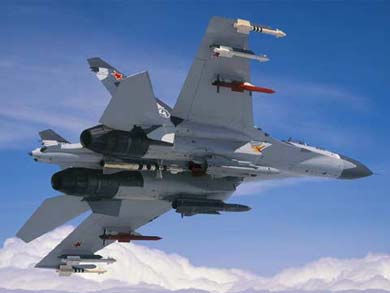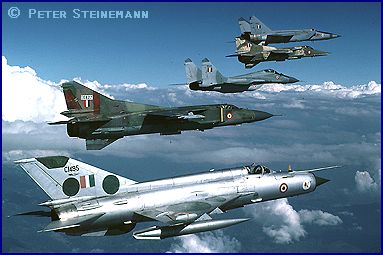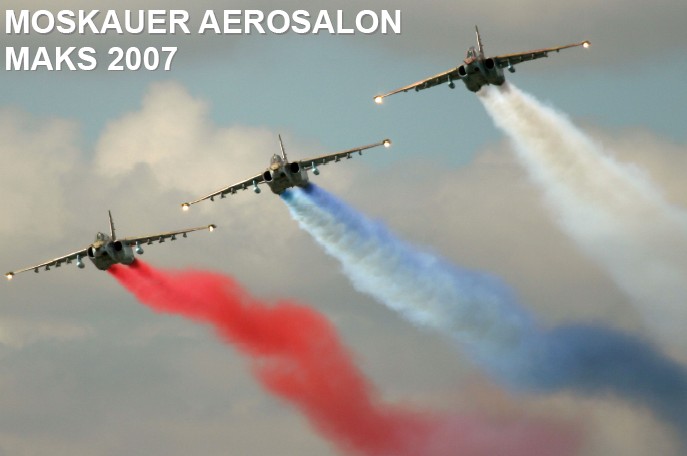Re: The Rise of the Russian Empire: Russo-Armenian Relations
A relatively old article from 2004 pertaining to aerial warfare. The article is about the performance of US Air Force pilots flying late model F-15s against pilots of the Indian Air Force flying an assortment of Russian build combat aircrafts. This article is very pertinent to today's assessment of the military capabilities of eastern block nations versus those of the western world. A similar article was posted within this thread some time ago. However, I wanted to take another look at this issue because there is a prevailing perception today in certain parts of the world, a false perception nevertheless, that western weaponry and military personnel are somehow superior to that of the Russian Federation.
Armenian
************************************************** *************
Convincing Taxpayers Nice and Easy

Indian Air Force SU-30 landing
By Viktor Litovkin
Moscow did not expecct anything like this from the US media. USA Today published an interview with General Hal Hornburg, who noted that India’s Su-30MKI multi-role fighters had completely defeated F-15C/D Eagle aircraft in 90% of mock dogfights. Gen. Hornburg, who heads the US Air Force’s Air Combat Command, said that US might not be as far ahead of the rest of the world as was originally thought. As the F-15 is the country’s main air-superiority fighter, the astonishing Indian victories may serve as a wake-up call for a number of senior figures in the Air Force, Gen. Hornburg added. This was only the first amazing revelation. The Inside Air Force official bulletin also discussed this “Russian victory”, mentioning even more shocking details. It turns out that F-15C/D Eagle fighters were pitted against Su-30MKI Flanker, as well as Mikoyan-Gurevich Mi-27 Flogger, MiG-29 Fulcrum and even ancient MiG-21 Bison warplanes. All of them were up to the mark, trouncing Eagles and French Mirage-2000 fighters, too. This came as a complete surprise for US pilots, the Washington ProFile web site says.


Russian military experts and aircraft designers did not show any signs of surprise after these victories. Sukhoi general designer Mikhail Simonov has repeatedly told the Russian Military Bulletin and other media bodies that the Su-27 Flanker and the Su-30MKI, modified version and now in service with the Indian air force, had been developed in the 1980s to deal with the F-15 Eagle. Moreover, Soviet designers stipulated far superior specifications well in advance. Consequently, experts are not particularly surprised that the performance of these fighters matches their specifications. On the other hand, Russian experts are surprised that the US top brass officially admitted this fact four months later. India’s Su-30MKI fighters and F-15C/D Eagles engaged each other in the skies over Elmendorf AFB, Alaska in February 2004, winning three out of four “dogfights”. However, no one mentioned their victory or many other similar facts back then. Russian fighters first triumphed over their US rivals in the skies over Korea and Vietnam. Apart from this, our warplanes won their first dogfights in the early 1990s, that is, when Sukhoi and MiG warplanes had just started taking part in international aerospace shows. At that time, several world-famous Su-27 fighters flew to Canada under the command of Maj.-Gen. Alexander Kharchevsky, who heads the Lipetsk center for retraining Russian air-force pilots, showing off their impressive potential there. (A Su-27 two-seater air-force trainer under the command of Kharchevsky carried President Vladimir Putin of the Russian Federation to Chechnya.)


Instead of missiles and artillery shells, Russian and US fighters used aerial gun cameras for recording their mock dogfights. US fighters were disappointed to learn about the results of these dogfights because their cameras did not show any Su-27s whatsoever. The Russians, though, had filmed their rivals from just about every angle, showing all vulnerable aircraft components.
Sukhoi Fighters Can Only Be Outnumbered Russian pilots owed their impressive success to the Su-27’s spectacular performance and its substantial thrust-to-weight ratio, rather than better aerial gun cameras. Their unsurpassed performance has already become a byword all over the world because no other warplane (except MiG fighters) can execute such mind-boggling stunts as Pugachev’s Cobra and some others.


The F-15, as well as the F-16 and the F-18, have a wide turning radius; Russian fighters, which can turn on the dime, merely switch on their after-burners, buzzing any other aircraft and dealing the coup de grace time and again. Apart from Canada, MiG-29 air-superiority fighters vied with their South Africa’s Mirage-2000 planes in the mid-1990s, defeating them all the same. Chief designer Arkady Slobodskoi, who supervises the MiG-29 program, claims that any MiG-29 will score a 100% kill, once its pilot has the enemy in his sights; it takes just five to six machine-gun bursts to down an enemy aircraft in such conditions, Slobodskoi added. The United States, which knows all about the dazzling combat potential of Russian fighters, even purchased a MiG-29K squadron from Moldova after the Soviet Union’s disintegration. (That squadron was deployed at an airfield near Chisinau.) Germany, which had obtained quite a few MiG-29s after reunification, helped repair these Moldovan fighters. Both Germany and the United States are now using these aircraft to train their pilots, so that they could cope with those 7,000 “Russian fighters” the world over.

Indian Air Force Tanker IL-78MK With Two SU-30MKIs
Great Britain’s Military Balance magazine estimates that India alone has more than 500 Russian-made fighters. It is hardly surprising that Indian pilots can defeat their US rivals in no time at all because unique aircraft and skilled pilots are a key to success, despite the US Air Force’s intensive combat training programs. On the other hand, US pilots have not confronted any strong adversaries for quite a while now, experts say. The US Air Force ruled the skies over Yugoslavia in 1999, disregarding professionalism back then. The same can be said about the 1991 and 2003 Iraqi campaigns because the Iraqi air force was grounded in both of them. Accordingly, mock dogfights are the only way to amass experience.
Where Are The Russians Heading?
The old-time Air Force mentality prevents its pilots from “confronting” their Russian counterparts because any possible setbacks would be detrimental to their morale; any USAF pilot must be convinced that he can and must defeat the former “theoretical enemy”. At the same time, no such problem exists during mock dogfights involving Indian pilots because one can explain their victories by inadequate training. We will get even with them next time, US pilots say.
But why does the United States inform the whole wide world about its setbacks? Neither Russian, nor US generals like to do this. The explanation lies on the surface: Congress discusses defense budget appropriations for the next fiscal year every June, which is why the US top brass has now started talking about February 2004 events. The projected US defense budget totals a fantastic $450 billion, exceeding Russian defense appropriations ten-fold. However, the Pentagon thinks this sum total is not enough and would like to get a bigger slice of the pie. Consequently, the US Defense Department is doing its best to enlist the support of ordinary taxpayers, so that the Congress will set aside additional monies. With this in mind, the Pentagon is telling the entire world about the dazzling success of Russian fighters and the defeat of its own warplanes. Such behavior is not reprehensible; on the contrary, it is quite useful. The Pentagon knows only too well that the US political establishment has always reacted painfully to the call “The Russians Are Coming”.
This is a good PR lesson, which we should learn, as well. Those who advocate an all-out rearmament program for Russia’s Armed Forces must learn this lesson, in the first place. Right now, they do not like to admit that Russian combat hardware and weapons are slightly inferior to their foreign equivalents. They are not confused by elementary logic, which implies that a lack of problems does not necessitate the modernization of weapons; nor does such logic call for developing and procuring new expensive weapons systems. Unlike their US counterparts, such people manage to obtain additional monies from Parliament and the Government behind the scenes, without relying on the public at large and ordinary Russians, whose monies are being channelled into the defense budget. We will be able to appreciate the results of this work soon enough, that is, after the 2005 defense budget is endorsed. Quite possibly, these results will be seen in Chechnya or Ingushetia.
Source: http://www.voltairenet.org/article136421.html
A relatively old article from 2004 pertaining to aerial warfare. The article is about the performance of US Air Force pilots flying late model F-15s against pilots of the Indian Air Force flying an assortment of Russian build combat aircrafts. This article is very pertinent to today's assessment of the military capabilities of eastern block nations versus those of the western world. A similar article was posted within this thread some time ago. However, I wanted to take another look at this issue because there is a prevailing perception today in certain parts of the world, a false perception nevertheless, that western weaponry and military personnel are somehow superior to that of the Russian Federation.
Armenian
************************************************** *************
Convincing Taxpayers Nice and Easy

Indian Air Force SU-30 landing
By Viktor Litovkin
Moscow did not expecct anything like this from the US media. USA Today published an interview with General Hal Hornburg, who noted that India’s Su-30MKI multi-role fighters had completely defeated F-15C/D Eagle aircraft in 90% of mock dogfights. Gen. Hornburg, who heads the US Air Force’s Air Combat Command, said that US might not be as far ahead of the rest of the world as was originally thought. As the F-15 is the country’s main air-superiority fighter, the astonishing Indian victories may serve as a wake-up call for a number of senior figures in the Air Force, Gen. Hornburg added. This was only the first amazing revelation. The Inside Air Force official bulletin also discussed this “Russian victory”, mentioning even more shocking details. It turns out that F-15C/D Eagle fighters were pitted against Su-30MKI Flanker, as well as Mikoyan-Gurevich Mi-27 Flogger, MiG-29 Fulcrum and even ancient MiG-21 Bison warplanes. All of them were up to the mark, trouncing Eagles and French Mirage-2000 fighters, too. This came as a complete surprise for US pilots, the Washington ProFile web site says.


Russian military experts and aircraft designers did not show any signs of surprise after these victories. Sukhoi general designer Mikhail Simonov has repeatedly told the Russian Military Bulletin and other media bodies that the Su-27 Flanker and the Su-30MKI, modified version and now in service with the Indian air force, had been developed in the 1980s to deal with the F-15 Eagle. Moreover, Soviet designers stipulated far superior specifications well in advance. Consequently, experts are not particularly surprised that the performance of these fighters matches their specifications. On the other hand, Russian experts are surprised that the US top brass officially admitted this fact four months later. India’s Su-30MKI fighters and F-15C/D Eagles engaged each other in the skies over Elmendorf AFB, Alaska in February 2004, winning three out of four “dogfights”. However, no one mentioned their victory or many other similar facts back then. Russian fighters first triumphed over their US rivals in the skies over Korea and Vietnam. Apart from this, our warplanes won their first dogfights in the early 1990s, that is, when Sukhoi and MiG warplanes had just started taking part in international aerospace shows. At that time, several world-famous Su-27 fighters flew to Canada under the command of Maj.-Gen. Alexander Kharchevsky, who heads the Lipetsk center for retraining Russian air-force pilots, showing off their impressive potential there. (A Su-27 two-seater air-force trainer under the command of Kharchevsky carried President Vladimir Putin of the Russian Federation to Chechnya.)


Instead of missiles and artillery shells, Russian and US fighters used aerial gun cameras for recording their mock dogfights. US fighters were disappointed to learn about the results of these dogfights because their cameras did not show any Su-27s whatsoever. The Russians, though, had filmed their rivals from just about every angle, showing all vulnerable aircraft components.
Sukhoi Fighters Can Only Be Outnumbered Russian pilots owed their impressive success to the Su-27’s spectacular performance and its substantial thrust-to-weight ratio, rather than better aerial gun cameras. Their unsurpassed performance has already become a byword all over the world because no other warplane (except MiG fighters) can execute such mind-boggling stunts as Pugachev’s Cobra and some others.


The F-15, as well as the F-16 and the F-18, have a wide turning radius; Russian fighters, which can turn on the dime, merely switch on their after-burners, buzzing any other aircraft and dealing the coup de grace time and again. Apart from Canada, MiG-29 air-superiority fighters vied with their South Africa’s Mirage-2000 planes in the mid-1990s, defeating them all the same. Chief designer Arkady Slobodskoi, who supervises the MiG-29 program, claims that any MiG-29 will score a 100% kill, once its pilot has the enemy in his sights; it takes just five to six machine-gun bursts to down an enemy aircraft in such conditions, Slobodskoi added. The United States, which knows all about the dazzling combat potential of Russian fighters, even purchased a MiG-29K squadron from Moldova after the Soviet Union’s disintegration. (That squadron was deployed at an airfield near Chisinau.) Germany, which had obtained quite a few MiG-29s after reunification, helped repair these Moldovan fighters. Both Germany and the United States are now using these aircraft to train their pilots, so that they could cope with those 7,000 “Russian fighters” the world over.

Indian Air Force Tanker IL-78MK With Two SU-30MKIs
Great Britain’s Military Balance magazine estimates that India alone has more than 500 Russian-made fighters. It is hardly surprising that Indian pilots can defeat their US rivals in no time at all because unique aircraft and skilled pilots are a key to success, despite the US Air Force’s intensive combat training programs. On the other hand, US pilots have not confronted any strong adversaries for quite a while now, experts say. The US Air Force ruled the skies over Yugoslavia in 1999, disregarding professionalism back then. The same can be said about the 1991 and 2003 Iraqi campaigns because the Iraqi air force was grounded in both of them. Accordingly, mock dogfights are the only way to amass experience.
Where Are The Russians Heading?
The old-time Air Force mentality prevents its pilots from “confronting” their Russian counterparts because any possible setbacks would be detrimental to their morale; any USAF pilot must be convinced that he can and must defeat the former “theoretical enemy”. At the same time, no such problem exists during mock dogfights involving Indian pilots because one can explain their victories by inadequate training. We will get even with them next time, US pilots say.
But why does the United States inform the whole wide world about its setbacks? Neither Russian, nor US generals like to do this. The explanation lies on the surface: Congress discusses defense budget appropriations for the next fiscal year every June, which is why the US top brass has now started talking about February 2004 events. The projected US defense budget totals a fantastic $450 billion, exceeding Russian defense appropriations ten-fold. However, the Pentagon thinks this sum total is not enough and would like to get a bigger slice of the pie. Consequently, the US Defense Department is doing its best to enlist the support of ordinary taxpayers, so that the Congress will set aside additional monies. With this in mind, the Pentagon is telling the entire world about the dazzling success of Russian fighters and the defeat of its own warplanes. Such behavior is not reprehensible; on the contrary, it is quite useful. The Pentagon knows only too well that the US political establishment has always reacted painfully to the call “The Russians Are Coming”.
This is a good PR lesson, which we should learn, as well. Those who advocate an all-out rearmament program for Russia’s Armed Forces must learn this lesson, in the first place. Right now, they do not like to admit that Russian combat hardware and weapons are slightly inferior to their foreign equivalents. They are not confused by elementary logic, which implies that a lack of problems does not necessitate the modernization of weapons; nor does such logic call for developing and procuring new expensive weapons systems. Unlike their US counterparts, such people manage to obtain additional monies from Parliament and the Government behind the scenes, without relying on the public at large and ordinary Russians, whose monies are being channelled into the defense budget. We will be able to appreciate the results of this work soon enough, that is, after the 2005 defense budget is endorsed. Quite possibly, these results will be seen in Chechnya or Ingushetia.
Source: http://www.voltairenet.org/article136421.html








Comment